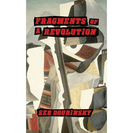Sacred Chickens
Menu
SACRED CHICKENS
 Fragments of a Revolution Author, Seb Doubinsky by Naomi Ulsted Seb Doubinsky’s novel, Fragments of a Revolution, plunges the reader into a world of violence in the first few pages. The reader will come to find the nuances, quirks and beauties within our narrator, Lorenzo’s memories of this failed 1969 revolution in Mexico, but Doubinsky makes sure the reader can’t forget this is no joke, an idealistic adventure, but not without violent consequences. Indeed, coming to terms with the violence of his past and his own attraction to it during his youth, is one of the primary struggles Lorenzo faces, as much later in life, he attempts to write an article about his experiences. Two and some decades later, he is one the sole survivors, a fact that makes him feel like a “loser.”. Doubinsky articulates the contrast between Lorenzo’s predictable, comfortable, and in Lorenzo’s own scathing rebuke, tedious, life he lives now in Denmark with the wild passions of his youth in Mexico. With lush words dripping with the heat of Mexico in spring, he contrasts sweat, passions and feverish action with the chilly landscape and tame domesticity of his life in Denmark. In Mexico, “the evening sun filtered through the curtain like a long sword of fire.” With his growing belly and structured life in his forties, that sword of fire is only one of distant his memories. As Lorenzo struggles to recall, he pulls us into this violent revolution founded upon such good intentions, yet implemented so haphazardly. Reminiscent of the incongruous oddities found in Conrad’s Heart of Darkness, the objects, people, and experiences Doubinsky hurls at us that feel out of place in our vision of a revolution serve to underscore the erratic nature of the movement. In the midst of a decision about an execution, a revolutionary grasps for the fable of a forbidden love story. In a town with bodies strewn within the buildings, a truck drives through the main street with a pieced-together musical band of teenagers playing random instruments. A dentist who dresses a clown joins the movement, prepared to die with his red nose affixed. Not a straight line, well planned and focused, but a confusing and terrifying bumbling, thoroughly enjoyable to those participating, including Lorenzo. In a conversation between Lorenzo and Joe (the American): “What do you think about all this?” he finally asked Joe, who was enjoying his smoke, eyes closed. The silence was getting on his nerves. “About what? The revolution?” “Yes, all that stuff.” Joe shifted to a more comfortable position. “We’re having fun, aren’t we?” Lorenzo smiled and shook his head. “Yeah, you’re right. We’re having fun”. Just as we are launched into Lorenzo’s story with violence, Lorenzo is launched into the revolution with violence. On a personal level, he joins the revolution for revenge and because he’s drawn to that violence and the seductive power of it. It is this, among others memories Lorenzo must face as a man in mid-life, parenting a young son who idolizes he father. I read this book during a sunny spring, sitting on my couch where I can watch the fruit trees budding in my back yard. Closed in on three sides with fences, I still hear my neighbors’ lawn mowers, their dogs barking, the shouts of my own kids chasing one another with foam swords around the fruit trees. I have never been part of a revolution. But like Lorenzo, I am a long way from the experiences of my twenties. I am a long way from those rambling adventures where I felt such optimism, freedom and confidence in my own ability to create art, live fully, and have an impact on the world. Half a life past, I have to reconcile with what I have accomplished and what I have not. Not that there isn’t time still to create and make a difference, but clearly as the years have passed, doors have closed, options have disappeared, and pathways were not taken. I was an avid letter writer in my twenties and kept copies of the hand-written letters. They fill in my memories now with the relationship dramas and the incredible mistakes I made. Yet, they also bring back that crazy hope and faith in my own potential to enact change, have an impact, and create something real, albeit in a bumbling and less –than-profound manner. Like Lorenzo, pulling together those fragments of memory means facing what has not been done. It means evaluating one’s actions and sometimes, coming up short. In one passage describing a scene from Lorenzo remembers from his childhood, Doubinsky writes, “A log explodes in the fireplace, sending sparks all around, toward emptiness, toward darkness, toward nothing.” Lorenzo’s time in the revolution was messy and volatile, but as an older man dragging back those memories of this doomed attempt to transform a country into something better, he has to face whether those sparks of his own creation caught hold or disappeared in the darkness. Sometimes, it might be easier to just look forward, rather than face what did not come to be.  Bio: Naomi Ulsted writes memoir and young adult fiction. Her work has been published in The New Guard, Mud Season Review and The Forge, among other journals. She lives in Utah with her husband and two boys.
0 Comments
Leave a Reply. |

Click Photo above to buy ebook or paperback from Amazon.
Here's the link to Barnes and Noble Or order through your favorite independent bookstore! Categories
All
|
 RSS Feed
RSS Feed